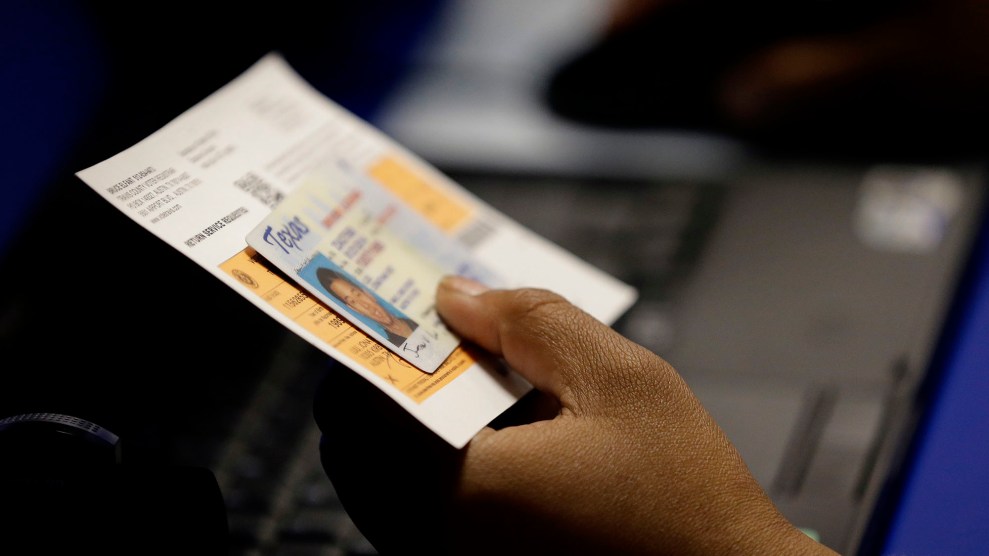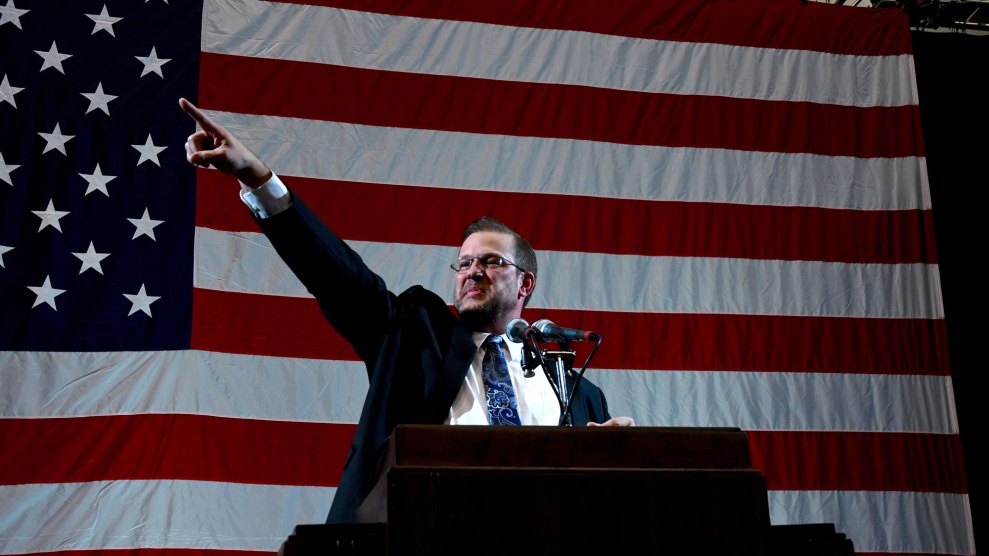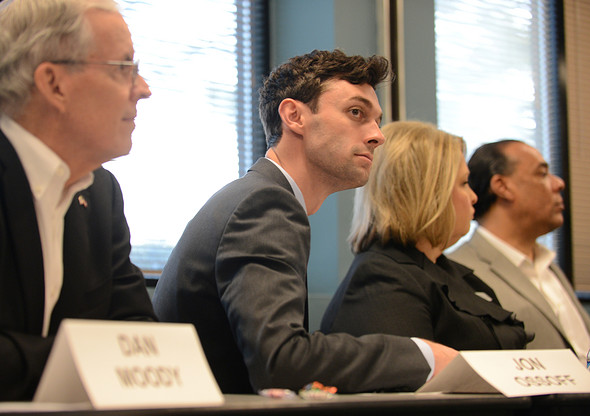
Reuters/ZUMA
Jon Ossoff doesn’t like to talk about his age. His reticence is understandable. Since the media and liberal voters foisted the 30-year-old political neophyte from the Atlanta suburbs into the national spotlight, he’s been celebrated by Democrats as a wunderkind who might lead the resistance against President Donald Trump and simultaneously ridiculed by Republicans, who fear the same thing, as a “spoiled frat boy.” As the front-runner in the heated special election race to replace Tom Price, whom Trump elevated to be his secretary of health and human services, in Georgia’s Sixth Congressional District—a seat not held by a Democrat since the 1970s—he has endured numerous attacks targeting his relative youth. One ad spliced authentic clips of Ossoff costumed as Han Solo from a college spoof video with stock footage of frat boys doing keg stands. “I don’t want to marginalize youth,” recently mused Bruce LeVell, 53, former head of Trump’s national diversity coalition and one of 11 Republican, five Democratic, and two independent candidates who will face off against Ossoff on April 18. “But I think that a wealth of life experiences can be a tremendous asset for a congressional seat.”
Speaking last week in Alpharetta, Georgia, at a mansion overlooking a lake, Ossoff had attracted so many supporters that the property’s owner nervously joked his deck might not be able to support the crowd. In the previous three hours, we’d visited four separate rallies where hordes of Democrats lined roads with signs reading, “Vote Your Ossoff.” “I’m trying to make the case to voters across the political spectrum,” Ossoff told the assembly, “that someone who brings a younger perspective”—then he corrected himself—”a fresher perspective…can change the culture in Washington more effectively than someone who has run for office 9 or 10 times.”
With his campaign promise to “Make Trump Furious,” Ossoff is riding a wave of disaffection among all Democrats, but millennials are an especially important part of his coalition. Consistently polling in the mid- to low 40s, Ossoff needs only a handful more percentage points to break the 50 percent threshold on April 18 and claim outright victory. If he fails to obtain a majority, he’ll face a much tougher runoff vote on June 20 versus the second-place finisher, in support of whom a critical mass of Republican voters might unite. The Sixth District is deeply Republican, with a white, elderly, and affluent voter base, which may be hard to sway from their traditional voting habits. But the district includes 146,000 people aged 18 to 34—about 27 percent of all eligible voters in the district—and Ossoff is relying, in part, on these young voters to turn out in unprecedented numbers and nudge him to victory. The race is so close that one of the only ways for Ossoff to win, in other words, is for large numbers of millennials to do for him what they didn’t do for Hillary Clinton: vote.
“My generation has gotten complacent about our rights,” Alison Curnie, 31, said on the deck overlooking the lake, as she endorsed Ossoff to the cheering crowd. “We thought they would be there in perpetuity. But if anything good has come out of this last election, it’s that we’re no longer complacent.”
During the two days I spent on the campaign trail, young people were an inescapable presence. Most staffers and volunteers I encountered were of the millennial generation, though there were plenty of older people as well. Ossoff’s supporters believe his youth is a positive quality, a way to bring a new mindset to Washington. As Matt Tompkins, 26, told me, “Ossoff is the first time we’ve had someone who represents our socially conscious values. Someone who’s 60 doesn’t have the worldview of being raised in modern reality with technology, the internet, diversity, and everything else.”
So far, millennials have been a dormant power in politics. As John Della Volpe, the director of polling at Harvard’s Institute of Politics, told me, “There are more millennials than any other generation on Earth, but they don’t vote in the same proportion that other generations do. The main reason they don’t vote is they don’t see a tangible impact from it, so the degree to which Ossoff can convince them that this election matters is going to be key.”
And so while a flurry of punditry in recent days has interpreted Ossoff’s campaign as a predictor of whether or not anti-Trump sentiment will be enough to buoy Dems to congressional victories over the next two years, his race also raises another and perhaps more pressing question: Can this 30-year-old, and the anti-Trump resistance of which he’s been anointed figurehead and bellwether, reenergize young voters’ enthusiasm for democracy in general and Democrats in particular?
“Previously, I’d been a registered Republican, even Libertarian leaning,” Curnie told me on the deck. “I used to have the luxury of being a Republican because I didn’t think anyone was coming for my birth control and civil rights. But this election has made me realize we’ve got to stick up for our civil rights before we worry about tax brackets.”
Ossoff’s success owes a great deal to his becoming an internet phenomenon. When he launched his campaign in early January with an email telling voters to “Make Trump Furious,” it caught the attention of liberal bloggers anxiously following the third congressional contest of the Trump era. Daily Kos, the left-leaning website, began promoting him. Donations poured in, with each fundraising success spurring more coverage. Today he has amassed more than $8.3 million in about three months, much of it from out-of-state voters—a record for a candidate who is not self-financed. His campaign says he has received nearly 200,000 separate donations from all over the nation, at an average size of $43.
Just as Ossoff has seized national attention in a particularly social-media-savvy way, his life before the race shows how a generation of millennials may be preparing for politics. Raised in the suburb of Northlake, Ossoff always dreamed of becoming a politician. He planted yard placards with his parents in support of local Democrats as a boy. By 2003, his childhood friend Karl Langberg, 30, remembers, he was running a blog devoted to politics and debating online with older readers, who didn’t know they were arguing with a teenager behind the screen. At Paideia, a pricy private high school, he started an alternative publication to the school newspaper, which he named the Great Speckled Pi in homage to a liberal underground Atlanta newspaper of the ’60s and ’70s. By then, his friends knew he wanted to one day run for office. “There was an understanding among our group,” says Dustin Chambers, another childhood friend, “that he wanted to run someday and he was equipping himself to do so.”
Ossoff’s focus on government continued while studying at Georgetown’s School of Foreign Service, during which he also worked part time for Rep. Hank Johnson. Facebook went global when he was a freshmen, forever transforming politics by recording every embarrassing moment of one’s youth. “But,” Chambers said, “Jon immediately became aware of how that altered the political landscape. It made clear to him that he needed to be a squeaky-clean guy.” After graduating, he managed Johnson’s 2010 reelection campaign and then worked for him full time on the Hill, specializing in national security issues.
Ossoff’s work for Johnson has been the substance of the one attack that has dinged his reputation. He carefully claims, “I’ve got five years of experience as a national security staffer in the US Congress. I held top-secret security clearance.” All of which is true—though two of those years he was working part time and he only held top-level clearance for five months at the end of his time on the Hill. “Technically, Ossoff walks a very careful line,” a Washington Post fact-checker wrote. “But the overall impression is misleading.”
In 2013, he earned a master’s degree at the London School of Economics, and then he became CEO of Insight TWI, a Vice-like new media company whose films have documented corruption among judges in Africa and the front-line battle against ISIS. As he traversed the globe with a camera, he still thought about seeking office but assumed it would be far in the future.
On the night of November 8, he was filming a right-wing militia in rural Georgia as men sat around a campfire and watched the election results roll in on their cellphones. Distraught, he drove an hour and a half to Manuel’s, a famous Atlanta watering hole for politicos, where he met his childhood friend Chambers and watched Trump claim victory. “I had never seen him so scared, so unsure,” Chambers, who is now a volunteer on Ossoff’s campaign, recalls. “He is one of those people who always has the answers. That night, I could see him calculating a lot of different disturbing outcomes for the next four years.”
The day after his appearance at the lake house, Ossoff sat onstage in the Dunwoody High School auditorium along with 17 other candidates—the full spectrum of American political opinion, from the tea party to moderate Republicans, including Karen Handel, his nearest competitor, with 15 percent of the vote in polls. The majority of voters were white-haired or bald and paged through programs as each candidate spoke, making notes. But most millennials in attendance already had their minds made up: They wore Ossoff blue and loudly cheered him.
While he waited for his turn to speak, Ossoff kept his gaze fixed on each speechifying opponent, as a Republican tracker in jean shorts and hiking boots aimed a minicam at his face. A tracker has been videotaping Ossoff’s every move for about two months, sometimes shouting questions at him, trying to force a reaction that can be turned into an attack ad or negative news story.
When Ossoff took the microphone, he said, “I worked on Capitol Hill for five years, and I saw how things work and how they do not. I saw the partisanship, the gridlock, the pettiness, and the corruption. I think it’s time for fresh leadership in Washington.” Speaking, he kept his hands clasped in front of him, his fingers carefully interlaced, never flourishing his arms or stabbing a finger to emphasize a point. The rest of his speech sketched plans to grow the district’s burgeoning technology sector and to fight government corruption, though it presented few details and lacked the shots at Trump that initially fired up the base. If there’s one signature issue that Ossoff has promised to tackle in Congress, it’s bringing his investigative documentary chops to bear on Washington—but the specifics of what muck he’d rake are hazy.
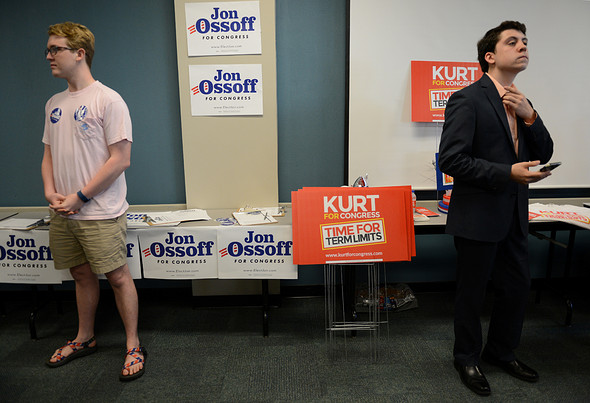
Ultimately, this is probably part of his strategy. Acknowledging the Republican tilt of the district, Ossoff has kept his recent statements just a few inches left of the center and vague. He has appealed to progressive Berniecrats primarily by positioning himself against Trump, but without pushing their core platform positions like single-payer health care, free tuition, or steep taxes on the rich.
Ossoff also has to appeal to the nearly 317,000 minorities in the district, especially in DeKalb County, where many are concentrated. However, the worst early voting turnout has been in the heavily Democratic DeKalb County, though this may partially be due to the fact that it has the worst voting access in the district.
It’s in regard to Ossoff’s fuzzy policies that this race circles back to larger questions about the fight against Trump. Can a classic liberal, whose positions seem more in line with the pre-Trump-era Democratic Party establishment, spark millennials to vote in significant numbers? If Ossoff ducks leading youthful progressives, is anti-Trump fervor and the implicit promise of shared life experience going to be enough for them to identity with him?
It’s a question the party is wrestling with on a national scale. Many liberals are angered that the Democratic Congressional Campaign Committee didn’t invest in the race for the seat vacated when Trump picked Mike Pompeo to become director of the CIA, believing they didn’t have a shot to win in the deeply red Wichita, Kansas, district—only to find that the Republican candidate barely triumphed. Ossoff’s surprise front-runner status is a testament to the power of the anti-Trump movement, but the flaws in his coalition also speak to fractures in the larger Democratic Party alliance that may sabotage his chances of electoral success.
Ossoff’s reticence to deeply engage with policy questions, and his statuesque self-control on the campaign trail, has led some observers to criticize him as stiff and lacking depth, including a recent New York magazine profiler. When I asked Ossoff for his response to the article, he said, “I’m trying to win a congressional race, not give spellbinding magazine interviews.”
But many of his millennial fans interpret his self-possession differently: As the result of growing up in an era when every stray bit of speech can end up broadcast across the world, “he knows that he’s being recorded every second,” Alexandra Brosovich, 24, whom I met at a rally, later told me on the phone. “Someone who grew up in the 1960s before cellphone videos and social media just doesn’t understand how careful you’ve got to be when everything’s recorded. He made an instant connection with me and my friends.”
Political reporters often want to call the same back-slapping, Big Mac-chomping extroversion authenticity. But maybe at heart Ossoff is simply an even-tempered, conscientious, and deliberate man. He’s the kind of guy who used the word “duplicative” in casual conversation and at rallies tried to substitute $10 words for ones like “folks.” According to his childhood friend Chambers, Ossoff even studied Barack Obama as a public persona to emulate. Ossoff summed up his own character to me by saying, “I think, for me, it’s important never to get too high and never to get too low. I just try to remain in a grounded, balanced place.”
One day, we visited a baseball field just a few minutes walk from the red-brick house where Ossoff grew up (which still had a fallen Clinton-Kaine yard sign lying by its driveway).
As Ossoff and I slung a grass-stained baseball back and forth, even after he shucked his suit jacket, his speech remained precise. When I asked about his strongest memory of that field, he answered, “Just playing catch with my dad, man, in the crisp autumn air, just as the leaves are starting to turn, when you can taste the first bite of winter, coming down here for that last time before it gets too dark, before it gets too cold.”
Those close to Ossoff acknowledge he is meticulous, but also point out that his exactingness is subordinate to his adventurousness—whether running for Congress or producing documentaries about a female battalion in Iraq. Ossoff has had a pilot license since he was a teenager. Today, in rare interludes of free time, he will gather a small group of friends before dawn, rent a Cessna, and then fly them to remote airstrips in the Appalachian Mountains, where they will hike all day before returning to Atlanta by dusk. “I love the challenge of mountains,” he told me, “the accomplishment of the summit, the vantage point, and the solitude.”
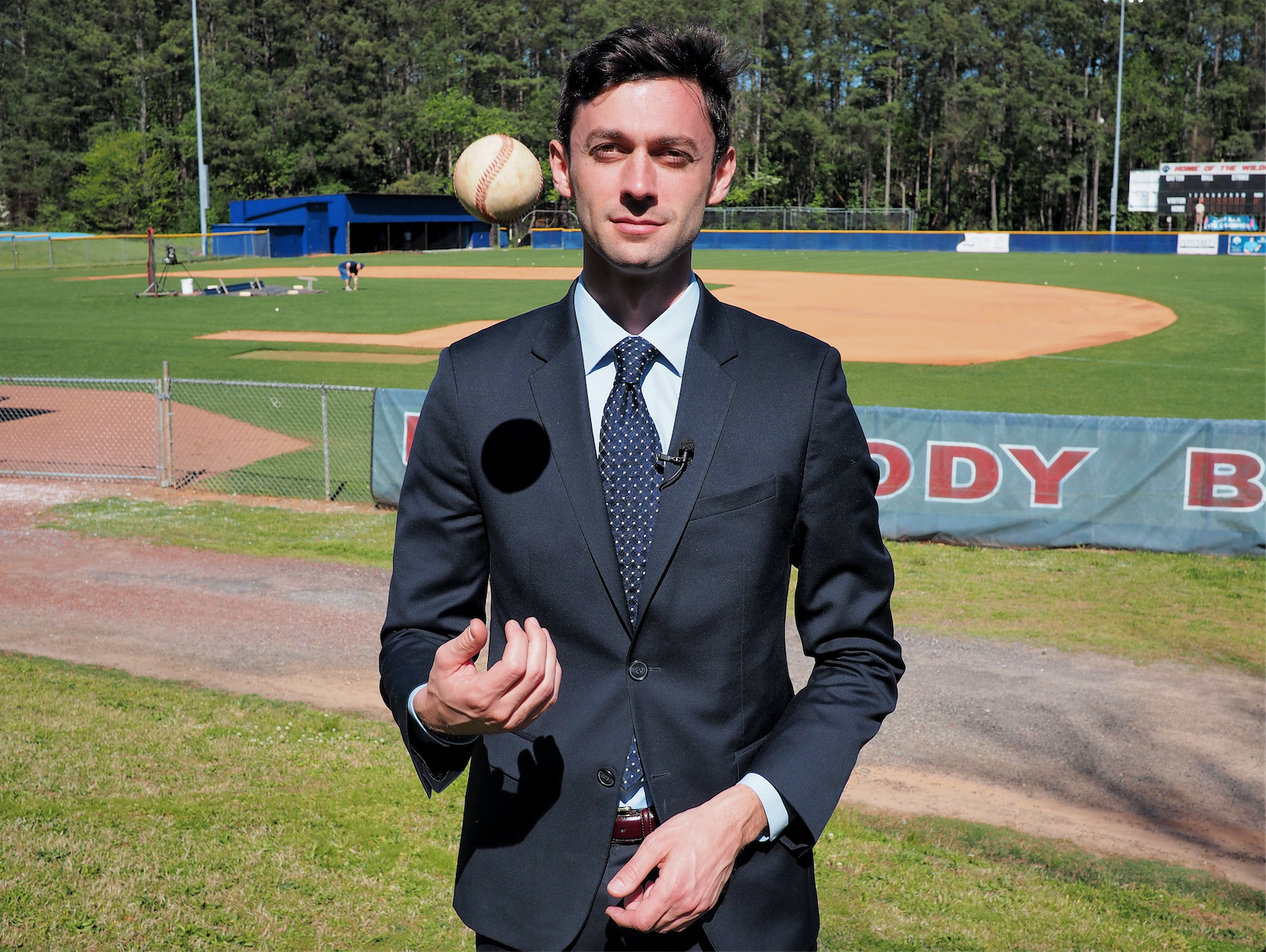
Photo by Doug Bock Clark
Despite Ossoff’s discipline, spend enough time with him and you’ll find his intensity palpable. The unspooling way he pitched the baseball at me looked effortless—he didn’t even break a sweat despite his button-up and tie—but as he pounded my palm with pinpoint accuracy, my hand numbed. Walking off the field, I asked, “What’s the event that made you who you are today?”
He looked around at the backstop and the basketball courts of the nearby elementary school. Twenty-four seconds slid by. He was new enough to this that he didn’t have an answer immediately at hand.
Then he said, with a bit of a snarl curling his voice for the first time, “I remember kids getting bullied on the playground. It really pissed me off. And right now, there are a lot of people being bullied in this country.”
